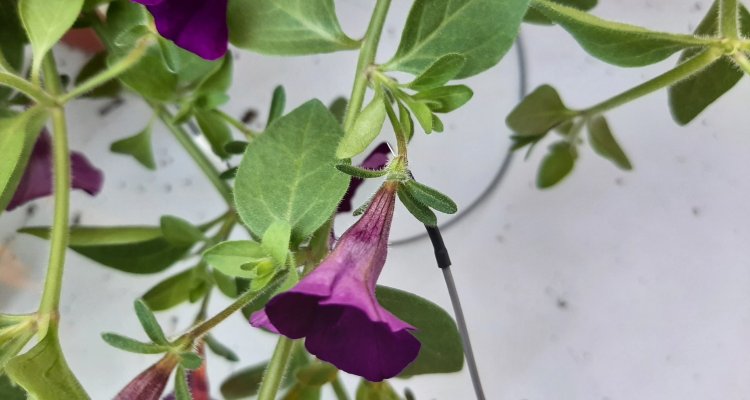Wageningen, The Netherlands
May 13, 2022

Living organisms are constantly sending out electrophysical signals. Plants use these electrical signals to detect stress when attacked by pests and diseases. The Business Unit Greenhouse Horticulture and Flower Bulbs of Wageningen University & Research is investigating whether sensors can recognize electrophysical signals.
With this knowledge, diseases and pests can be recognized at an earlier stage, and control measures can therefore be taken more quickly. This is important for propagators: they want to supply clean plants to growers, who in turn want to detect possible contamination as quickly as possible.
Earlier research by WUR showed that it is indeed possible to intercept electrophysical signals. For this study, a strawberry plant was infected with thrips. With an electrophysical sensor, the contamination could be detected after only 2 days. This means a significant time saving compared to visual inspection: usually it is only after about 5-6 days that the leaves take on a silvery glow, which can only be seen by a good inspection of the plants.
The new 2-year study focuses on a vegetable crop (tomato) and an ornamental plant (gerbera, petunia or Helianthus) and on three threats: mildew, thrips and a virus. During the first weeks of the research, Vivent's electrophysical sensor measures which signals the crop transmits in a normal state, and passes them on to the underlying software. This is followed by targeted infections with the damage organisms. The idea is that the software learns through artificial intelligence to recognize the specific signals of the crops on the damage organisms.
The research is funded by the Club van 100 of the WUR. The following companies are involved as representatives of this: Koppert Biological Systems, Florensis, Valto, Syngenta Flowers, PlantoSys and Agrifirm.
Sensor ontvangt stresssignalen van aangevallen plant
Levende organismen zenden voortdurend elektrofysische signalen uit. Die elektrische signalen gebruiken planten om stress te detecteren bij een aanval door ziekten en plagen. De Business Unit Glastuinbouw en Bloembollen van Wageningen University & Research onderzoekt of sensoren die elektrofysische signalen kunnen herkennen.
Met die kennis kunnen ziekten en plagen in een eerder stadium herkend worden, en dus sneller beheersmaatregelen genomen worden. Dit is belangrijk voor opkwekers: die willen immers schone planten leveren aan telers, die op hun beurt eventuele besmettingen zo snel mogelijk willen constateren.
Uit eerder onderzoek door WUR bleek dat het inderdaad mogelijk is om elektrofysische signalen te onderscheppen. Voor dit onderzoek werd een aardbeienplant besmet met trips. Met een elektrofysische sensor kon al na twee dagen die besmetting worden geconstateerd. Dat betekent een flinke tijdwinst vergeleken met visuele inspectie; meestal valt pas na circa vijf tot zes dagen op dat de bladeren een zilveren gloed krijgen, die alleen door een goede inspectie van de planten te zien is.
Het nieuwe tweejarig onderzoek richt zich op een groentegewas (tomaat) en een sierplant (gerbera, petunia of Helianthus) en op drie bedreigingen: meeldauw, trips en een virus. De eerste weken van het onderzoek meet de elektrofysische sensor van Vivent welke signalen het gewas in een normale toestand uitzendt, en geeft die door aan de achterliggende software. Daarna volgen gerichte infecties of plagen met de schadeorganismen. Idee is dat de software door kunstmatige intelligentie leert de specifieke signalen van de gewassen op de schadeorganismen te herkennen.
Het onderzoek wordt gefinancierd door de Club van 100 van WUR. Als vertegenwoordigers hiervan zijn de volgende bedrijven betrokken: Koppert Biological Systems, Florensis, Valto, Syngenta Flowers, PlantoSys en Agrifirm.